Cat Rambo's Blog, page 21
October 15, 2019
Guest Post: Chelsea Eckert on On Writing Anthropomorphic Animal Characters (For Adults)
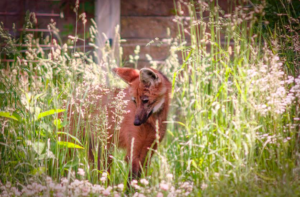 As someone who works deeply in the zoo/conservation industries and spends a lot of time pretending to be a tiger at conventions around the country, you might say I’m enthusiastic about animals.
As someone who works deeply in the zoo/conservation industries and spends a lot of time pretending to be a tiger at conventions around the country, you might say I’m enthusiastic about animals.
You’d be wrong, of course.
I’m zealous in my love for them. If I could be a little shield-carrying furry paladin, I would. (In fact, I play one in a homebrewed Dungeons and Dragons campaign.) I could go on and on about the why—because as an autistic person I relate to critters more, because there’s always something new to discover about ‘em, because they’re just badass—but the point is this…
I love writing about them. I love reading about them, especially in fictional settings. Whether they live in a Society or still bolt from men with guns, they’re fascinating. Yet I’ve found that most “talking animal” tales out there are for kiddos. Y’know: Redwall, Peter Rabbit, and the like.
or still bolt from men with guns, they’re fascinating. Yet I’ve found that most “talking animal” tales out there are for kiddos. Y’know: Redwall, Peter Rabbit, and the like.
If you’re like me—in the furry fandom or furry-adjacent, or just someone who admires the natural world and takes inspiration from it—you may want to know how to go about writing anthropomorphic animal characters for adults.
There’s two things you gotta consider when you’re writing anthropomorphic animals for an adult tale:
Unless you’re specifically looking to write an allegory, you have to actively avoid making your species and characters allegorical or symbols or stand-ins for something. It’s rather patronizing at best and can get offensive at worst. (FYI, we’re not dealing with allegory in this post.)
At the same time, you don’t want to be self-indulgent and make all your characters, like, hyenas just because it’s cool, as much as I totally understand the compulsion. (Did you know that spotted hyenas may have critical thinking skills on par with chimpanzees?)
So, in short—don’t use your animals as overwrought symbols if you’re not trying to tell a story that way, but also, at the same time, ensure your animal characters feel authentic and purposeful in the story.
Sound confusing? Paradoxical? Yeah, I get it.
It comes down to this: use the real-life differences between animals and ourselves to explore whatever themes, aesthetics, relationships, etcetera you want in your writing.
Examples:
African lions (Panthera leo) have a complex social structure. Related females live together and share one to four related males; these males, most of the time, prefer to stay on the outskirts of the territory to protect it. Male cubs, and sometimes female cubs, leave the pride after a certain age. What kind of stories can you tell about family, home, and love with anthropomorphic lions?
Virginia opossums (Didelphis virginiana) famously ‘play dead’ as a defense mechanism. What kind of society would develop around a race or culture that involuntarily goes limp at the drop of a hat?
Numerous insects go through an intermediate pupa stage before emerging as an adult. In an anthropomorphized world, is this transformation celebrated? Feared? Is it spiritual or magical? How do insect civilizations work, knowing that a part of their young population is, at any time, inert inside of a cocoon etcetera?
You get the picture, I think.
Essentially? Just treat your anthropomorphic animal characters as you would any other fantasy species you’re putting together. Tell stories that require animal characters. It’ll all work out…which I’m sure is easier said than done, else I wouldn’t have to write this post at all.
And so! My tips to find inspiration for your anthropomorphic characters and portray them in a sincere, intelligent manner…
First, do your research on the animals you want to scribble about. Non-fiction research, naturalistic research. Go to the zoo and stare; watch documentaries twice, once with the sound on and once with the sound off. Try to avoid folklore or myth as it can lead you into allegory, although giving your animal-folk these beliefs as a part of their culture can create a multilayered narrative. Magic’s a pretty awesome use for animal-based misconceptions, too: no, it isn’t true that goldfish have a five-second memory, but maybe they’re masters at amnesia-based magic.
Second, remember, still, to have fun. I outlined a lotta DO NOT in this post, but there’s a lotta DO. Do imagine interesting cultural, magical, and spiritual reasons for why animals do that weird thing. Do tell stories in space and in kingdoms, in dystopias and in alternate dimensions. Do give your animals diverse personalities, ways of thinking, ways of being. Do breathe empathetic life into creatures that most folks don’t even think about.
And do write about animals that talk, for grown-ups like you and me. Whether your critters walk on two legs or four (or have wings), you’ve got it in you to create a fantastic, genuine story that just happens to feature wolves and tigers and boars at its center.
Before I head out, here’s a few books and other pieces of media that I feel present really thoughtful anthropomorphic animal characters:
Watership Down by Richard Adams. Adams’ rabbits aren’t just fuzzy humans—they have their own beliefs, their own culture, their own limitations, most of which are based on how wild rabbits truly act. Adams did his research. (He got some of it wrong, but hats off to the dude. This book is enthralling and creepy.)
Barsk: The Elephants’ Graveyard by Lawrence M. Schoen. Sci-fi with anthro elephants. It really doesn’t get much better than that…or much more creative!
Juan Díaz Canales and Juanjo Guarnido’s Blacksad comics. Detective noir with animal characters. The universe has a history that parallels our own—the comics deal with the post-WWII era—but each species has a culture, has a personality.
Fudoki by Kij Johnson. Kind-of a cheat on this list, as the cat protagonist temporarily turns into a human, but it’s wonderful for its depictions of cat culture (and medieval Japanese culture, too!).
Disney’s Zootopia. It’s a movie, yes, and it’s for kids, yes, and it leans a little into allegory, yes, but the crew behind the film put thought into what a consolidated society of mammals would look like. Prey animals find predator animals a little unnerving; bunnies can’t be cops, because they’re not bulky like elephants or polar bears; trains need different-sized compartments for everything from hamsters to giraffes. The story and the universe feels purposeful.
About the Author: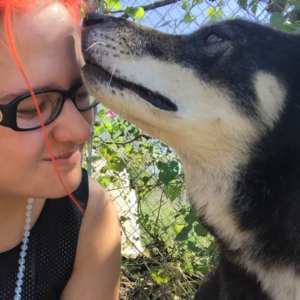 Chelsea “Little Bean Tiger” Eckert (she/her) is a graduate of UNC Greensboro’s MFA program, as well as a zoo worker, furry, and fantasy fiction fan. A nonbinary writer, she happily babbles about queerness, anime chicks, and her love of binturongs to anyone who will listen. She’s proud to be the sometimes-haggard but always-cheery Communications Director of Atlanta’s MultiverseCon. You can find her either 1) at your local furry con running animal quiz shows, 2) spamming the Multiverse Slack with memes only she finds funny, or 3) on Twitter (@chelseayrbff).
Chelsea “Little Bean Tiger” Eckert (she/her) is a graduate of UNC Greensboro’s MFA program, as well as a zoo worker, furry, and fantasy fiction fan. A nonbinary writer, she happily babbles about queerness, anime chicks, and her love of binturongs to anyone who will listen. She’s proud to be the sometimes-haggard but always-cheery Communications Director of Atlanta’s MultiverseCon. You can find her either 1) at your local furry con running animal quiz shows, 2) spamming the Multiverse Slack with memes only she finds funny, or 3) on Twitter (@chelseayrbff).
If you’re an author or other fantasy and science fiction creative, and want to do a guest blog post, please check out the guest blog post guidelines. Or if you’re looking for community from other F&SF writers, sign up for the Rambo Academy for Wayward Writers Critclub!
#sfwapro
October 10, 2019
Checking In: October Stuff
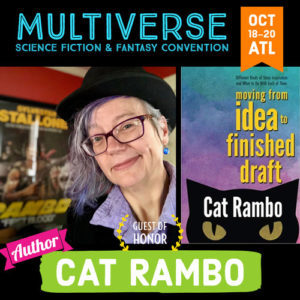 I’m off to Multiverse Con next week – it’s their first year, and I’m there as Industry Guest of Honor along with Seanan McGuire and John Piccacio. Come say hi if you’re there! Two weeks after that I’ll be up in Surrey BC as a presenter at the Surrey International Writers Conference.
I’m off to Multiverse Con next week – it’s their first year, and I’m there as Industry Guest of Honor along with Seanan McGuire and John Piccacio. Come say hi if you’re there! Two weeks after that I’ll be up in Surrey BC as a presenter at the Surrey International Writers Conference.
In writing stuff, I am working hard this month on EXILES OF TABAT, which should go to beta readers on November 1. THE FIVE OF US, my middle grade space opera, just went off to readers at the beginning of the month. Next up in writing is the sequel to the Tor space opera, which will be my November project. In December, I’m going to focus on short stories and outlining three of my 2020 projects: a horror novel, a novella project, and the third space opera book.
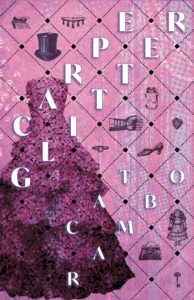 I just got the advance reading copies of CARPE GLITTER, my novelette coming out on the 29th with Meerkat Press. It’s a slim little book, and contains the story of a young woman who finds more than she expected when cleaning out the accumulated belongings of her stage magician grandmother, and asks the question – what do we do with unwanted inheritances when they’re part of our family?
I just got the advance reading copies of CARPE GLITTER, my novelette coming out on the 29th with Meerkat Press. It’s a slim little book, and contains the story of a young woman who finds more than she expected when cleaning out the accumulated belongings of her stage magician grandmother, and asks the question – what do we do with unwanted inheritances when they’re part of our family?
Here’s a lovely early review from Sebastian Doubinsky:
Really enjoyed this family drama cum magic (mostly black) taking place in a late Not-So-Fairy-Grandmother’s house. Trying to find some interesting (and probably sellable) stuff in her deceased granny’s house, Persephone stumbles on stranger and more dangerous things than she had hoped for. A short, enjoyable and beautifully mastered anti-fairy tale novella, which offers more than its glittery surface indicates. Highly recommended for the readers who like true complexity hidden behind apparent simplicity.
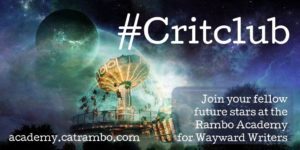 One thing that’s helped keep me productive is working with the new Rambo Academy Critclub, our online community for fantasy and science fiction writers who want to exchange critiques, market news, advice, and pictures of their pets. Want to join us? You can by being a supporter on Patreon or by subscribing through Paypal. Here’s the details. Critiquing is not mandatory! Come hang out and see what you think.
One thing that’s helped keep me productive is working with the new Rambo Academy Critclub, our online community for fantasy and science fiction writers who want to exchange critiques, market news, advice, and pictures of their pets. Want to join us? You can by being a supporter on Patreon or by subscribing through Paypal. Here’s the details. Critiquing is not mandatory! Come hang out and see what you think. 
October 9, 2019
Guest Post: Catherine Lundoff Talks About Gothic Horror And Me
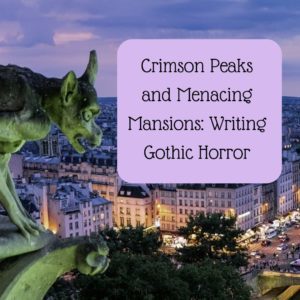 This Sunday, Catherine Lundoff will be teaching a class that’s particularly apropos for this Halloween-laden month, on one of my favorite flavors of horror: gothic fiction. She talks about some of the influences that have brought her to gothic fiction, and what she loves about it.
This Sunday, Catherine Lundoff will be teaching a class that’s particularly apropos for this Halloween-laden month, on one of my favorite flavors of horror: gothic fiction. She talks about some of the influences that have brought her to gothic fiction, and what she loves about it.
Edward Gorey was one of the guiding lights of my teenage years. I saw his sets for “Dracula” on Broadway when I was about twelve and it was like coming home, aesthetically, at least. I loved his black and white drawings, his weird stories, his obsessions with cats and opera singers. I still do. I like to think of him as my posthumous Fairy Gothmother, who opened the door to a marvelous dark universe where I could wear black all the time and didn’t need to pretend to be happy if I wasn’t.
I read Dracula, of course, and “Carmilla” and Poe and Wilde and Northanger Abbey. Austen turned me on to Ann Radcliffe, but I found Byron on my own. I discovered fashion, the kind where you rim your eyes with liner and wear multiple black on black outfits that have, perhaps, a hint of lace or silk, if you are lucky. And when I got to college, it was 1981 and there I found Adam Ant and Prince and Siouxsie Sioux, along with glorious morbid folk rock bands like Steeleye Span. So many murder ballads! So much gender play and glorious costumes! All of it became a part of me long before I thought of myself as a writer or a teacher or as Goth.
I devoured Gothic romances by the likes of Victoria Holt and Mary Stewart, Gothic horror in its multimedia splendor, even more murder ballads, artwork, outfits with all the black lace my teenage heart could imagine. Starting to write ghost stories and tales of haunted mansions could not be far behind, though in my case it started with vampire stories and editing the first (to the best of my knowledge) anthology of lesbian ghost stories. From there, I moved on to writing ghost stories myself as well as monster tales, media tie-ins, psychological horror, each story shaped and honed by my earlier reading and watching.
These days, I’m a huge fan of Gothic horror and romance films and shows like Crimson Peak, Penny Dreadful and The Addams Family. I’ve written horror tales for publications like Respectable Horror, Fireside Fiction and one of the Vampire the Gathering 20th Anniversary tie-in anthologies, as well as my own collection, Unfinished Business: Tales of the Dark Fantastic. A childhood enthusiasm has morphed into a lifelong affinity for ghosts, haunted mansions and various interpretations of the monstrous.
I love watching authors and other creators turn their eye to new interpretations of female and queer monsters and different kinds of outsider survivors. The Gothic Heroine doesn’t have to be a cisgendered white Final Girl or married under dubious circumstances to a love interest who is, perhaps, not to be trusted. I want to read more of these stories, as well as classics like The Woman in Black and We Have Always Lived in the Castle. Let me help you bring your dark fiction into the light and help it come alive, no pun intended. Crimson Peaks and Menacing Mansions is an online class that I’m teaching on 10/13 from 9:30-11:30 PST at Cat Rambo’s Academy for Wayward Writers.. It will include a mix of lecture, discussion and writing exercises, as well as the opportunity to ask questions. I hope you’ll be intrigued enough to check it out!
October 1, 2019
Guest Post: Roxanne Bland on Living in the Underground
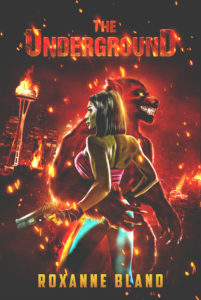 “This is the weirdest book I’ve ever read.”
“This is the weirdest book I’ve ever read.”
That’s what one woman wrote in her pre-release review of my paranormal urban fantasy/romance/science fiction hybrid The Underground. What a fabulous compliment! I wasn’t going for weird when I wrote the story but that’s the way my mind works so I’m happy to know my weirdness shone through. Still, I wonder what it was about the novel she found strange. Could it be The Underground is the story of an alpha werewolf and an interstellar assassin who fall for each other? Hm…maybe it was the sex. It’s not every day one snags a ringside seat at the Bedroom Olympics where one of the partners is an eight-foot wolf.
I’ve been asked how I came up with an outlandish tale like The Underground. Well, it’s like this. One oppressively hot and humid afternoon, I was sitting in a city bus with no air conditioning, sweating buckets in my vinyl seat and breathing car exhaust from outside the open window. Between the heat and the pollution, I was close to fainting. I didn’t want that to happen because the bus people the city where I lived were notorious for swiping your stuff if you fell asleep or died or something. So I started playing the “what-if” game. The game starts with a question, and then I keep asking questions about whatever topic I’m exploring until I’ve spun it out to it’s logical—or not-so-logical—conclusion. It’s not that much different from a teaching tool called the Socratic method, a sick, twisted version of the what-if game professors play with their innocent students.
Sweltering in that uptown bus, I asked what would it take for a werewolf to survive in today’s world?
I flung myself down that rabbit hole with glee, envisioning various rural and urban scenarios, the problems they present and how our werewolf could successfully deal with them. I was noodling my way through a complication when it struck me that a werewolf trying to lead as normal a life as possible in his world where he is marginalized and hunted by those in power wouldn’t be that much different from someone trying to lead a normal life in our world where he is marginalized and hunted by those in power. People die every day because of their skin color, sexual orientation and identity, belief systems, and whatever else the various human tribes, being the xenophobic and murderous lot they are, find unacceptable. To live, a werewolf would have to spin a web of lies and keeping track of them all would be a Herculean task. Then there’s having to live in a constant state of hyperawareness, knowing every person who crosses his path is a potential enemy. Surviving the human horde would be like walking a tightrope a hundred feet above the ground without a safety net. What a hard and exhausting way to live. But how much different really, is the werewolf’s life from his real-world counterparts—those who can’t escape the closet, who can’t break out of the egg, or who can’t bear living life as a second-class citizen? I didn’t create a world for The Underground—it’s our world.
That’s not quite the end of it, though. I was in the middle of an explanation about The Underground world to a friend (and potential reader) when she interrupted me and said, “so why the space alien?” First, let me tell you that rabbit hole took me to some mighty strange places. While I was rooting around down there, I began thinking about how someone from another planet might be treated by society’s outcasts if they discovered her. All things being equal, would they embrace her otherness, recognize her as kindred and hide her amongst themselves? Or, like humans, would they reject her, seeing her as a threat and betray her presence to the larger world? I had no answer. But the question intrigued me so I decided to explore it. If you want to know how it worked out, buy my book.
So the trials faced by werewolves and other paranormals trying to survive in a fantasy world where exposure means certain death aren’t much different than the those faced by any other persecuted people in the real world. Which led me to a final question: What would happen in The Underground’s world—or in this one—if the downtrodden reached the breaking point and decided they wouldn’t take their lot anymore? History tells us the answer. Oppress people long enough and hard enough, they will eventually rise up. And the results won’t be pretty.
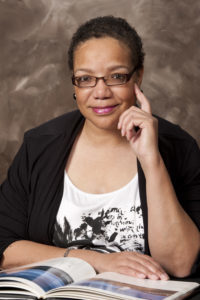 About the author: Award-winning author Roxanne Bland was born in the shadows of the rubber factory smokestacks in Akron, Ohio but grew up in Washington, D.C. As a child, she spent an inordinate amount of time prowling the museums of the Smithsonian Institution. She also spent an inordinate amount of time reading whatever books she could get her hands on, including the dictionary. A self-described “fugitive from reality,” she has always colored outside the lines and in her early years of writing, saw no reason why a story couldn’t be written combining the genres she loved, and did so despite being told it wasn’t possible.
About the author: Award-winning author Roxanne Bland was born in the shadows of the rubber factory smokestacks in Akron, Ohio but grew up in Washington, D.C. As a child, she spent an inordinate amount of time prowling the museums of the Smithsonian Institution. She also spent an inordinate amount of time reading whatever books she could get her hands on, including the dictionary. A self-described “fugitive from reality,” she has always colored outside the lines and in her early years of writing, saw no reason why a story couldn’t be written combining the genres she loved, and did so despite being told it wasn’t possible.
Today, she writes stories that are hybrids of paranormal urban fantasy, romance, and science fiction. She is enamored of Great Danes and has been owned by several. She lives in Maryland with her current owner, Daisy Mae. Discover more at http://www.roxannebland.rocks, or follow her on Twitter as @RoxanneBland2.
September 26, 2019
Guest Post: Dawn Vogel on Fairy Tales and Fiction
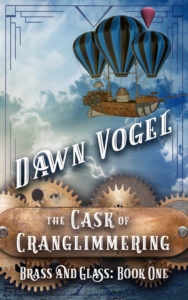 Fairy tales have been around in one form or another for centuries, even if they weren’t written down and compiled into collections like Grimm’s Fairy Tales. They’ve changed over the centuries as well, shifting from folk stories to morality tales to more sanitized or “Disney-fied” versions of what they once were. In the process of this sanitization, oftentimes the messages the fairy tales purported to dictate have changed. Gone is the Little Mermaid who watched her beloved marry someone else, at which point she cast herself back into the ocean and drowned, showing us that you shouldn’t change for someone you love. Instead, we get the version where the mermaid and prince live happily ever after, flipping the moral to be that you can (and should?) change in order to make someone love you.
Fairy tales have been around in one form or another for centuries, even if they weren’t written down and compiled into collections like Grimm’s Fairy Tales. They’ve changed over the centuries as well, shifting from folk stories to morality tales to more sanitized or “Disney-fied” versions of what they once were. In the process of this sanitization, oftentimes the messages the fairy tales purported to dictate have changed. Gone is the Little Mermaid who watched her beloved marry someone else, at which point she cast herself back into the ocean and drowned, showing us that you shouldn’t change for someone you love. Instead, we get the version where the mermaid and prince live happily ever after, flipping the moral to be that you can (and should?) change in order to make someone love you.
“Original” versions of fairy tales can be a loaded term, in that most of the fairy tales we know today existed in an oral format prior to being written down. When the stories were written down, they were not always faithful to the original tellings. Charles Perrault’s versions of fairy tales were reworked so they would be popular amongst the seventeenth-century French aristocracy. In the nineteenth century, the Grimm brothers, in the first versions of their compilations of fairy tales, acted primarily as transcriptionists, interested in recording the stories as they were commonly told among the German populace. In later versions of the Grimm brothers’ collections, however, they began the sanitization process, making the tales more family friendly.
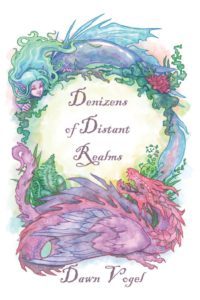 There is no denying that many of the “original” fairy tales were violent, sexist, and gruesome. They’re filled with death, abuse, self-mutilation, and more. Some of these tales were likely used by the tellers to imbue the listeners (or readers) with specific moral values or lessons or warn them against things like going into the woods alone at night or engaging in other dangerous activities. Perrault and the Grimm brothers also added to these moral lessons but shaped them to their own times and audiences. For example, stories that originally included birth mothers often were changed to instead include stepmothers, who were invariably vain, evil, and not interested in the welfare of their young charges. That the “original” stories ascribed these same motives to birth mothers is a fascinating bit of historical curiosity, but that stepmothers were so much more readily demonized might be even more intriguing as an avenue of study.
There is no denying that many of the “original” fairy tales were violent, sexist, and gruesome. They’re filled with death, abuse, self-mutilation, and more. Some of these tales were likely used by the tellers to imbue the listeners (or readers) with specific moral values or lessons or warn them against things like going into the woods alone at night or engaging in other dangerous activities. Perrault and the Grimm brothers also added to these moral lessons but shaped them to their own times and audiences. For example, stories that originally included birth mothers often were changed to instead include stepmothers, who were invariably vain, evil, and not interested in the welfare of their young charges. That the “original” stories ascribed these same motives to birth mothers is a fascinating bit of historical curiosity, but that stepmothers were so much more readily demonized might be even more intriguing as an avenue of study.
Beyond even the changes that Perrault and the Grimm brothers made to the “original” fairy tales, modern sensibilities have again shifted the telling of these stories, cleaned them up further, and completely rewritten them into things that barely resembles the “originals”. Like the Little Mermaid example above, the retelling of fairy tales as children’s movies, often animated and turned into musicals, can obliterate the original meaning, though not always for the worse. The “original” Beauty and the Beast story from seventeenth-century France was written to prepare young girls for arranged marriages, and had an emphasis on learning to love someone you didn’t know, whereas the Disney version of Beauty and the Beast involves character growth for both Belle and the Beast, who learn to love each other, rather than simply expecting the woman to do all the work. This example, in particular, also reflects the time in which it was turned into a movie, considerably different from earlier Disney films in which the female protagonists sometimes were denied the agency that Belle is permitted. Other retellings of fairy tales have stripped away the morality entirely, or occasionally taken a story that was more about avoiding dangerous activities, in a way that did not really require a moral, and added a moral in for good measure (like various versions of Little Red Riding Hood).
Though the origins of many fairy tales are lost to history, the ability to compare various versions of tales as they have been told over the centuries is a fascinating endeavor, both for what they tell us about broadly defined history and what they tell us about storytelling and writing in various times.
 About the author: Dawn Vogel’s academic background is in history, so it’s not surprising that much of her fiction is set in earlier times. By day, she edits reports for historians and archaeologists. In her alleged spare time, she runs a craft business, co-edits Mad Scientist Journal, and tries to find time for writing. She is a member of Broad Universe, SFWA, and Codex Writers. She lives in Seattle with her husband, author Jeremy Zimmerman, and their herd of cats. Visit her at http://historythatneverwas.com or follow her on Twitter @historyneverwas. Dawn’s latest book is The Cask of Cranglimmering, Book One of Brass and Glass.
About the author: Dawn Vogel’s academic background is in history, so it’s not surprising that much of her fiction is set in earlier times. By day, she edits reports for historians and archaeologists. In her alleged spare time, she runs a craft business, co-edits Mad Scientist Journal, and tries to find time for writing. She is a member of Broad Universe, SFWA, and Codex Writers. She lives in Seattle with her husband, author Jeremy Zimmerman, and their herd of cats. Visit her at http://historythatneverwas.com or follow her on Twitter @historyneverwas. Dawn’s latest book is The Cask of Cranglimmering, Book One of Brass and Glass.
September 25, 2019
Late September Thoughts and Checking In
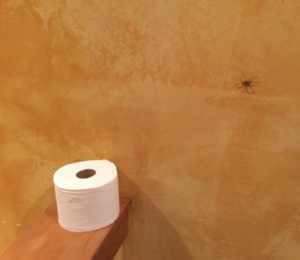 I’ve been reveling in a chance to be productive and at home after a summer so full of travel, and have been getting at least 1-2k words in on most days, plus I’ve gotten back to early morning gym runs, so hurray me and boo for the fact that it stays dark later and later every day.
I’ve been reveling in a chance to be productive and at home after a summer so full of travel, and have been getting at least 1-2k words in on most days, plus I’ve gotten back to early morning gym runs, so hurray me and boo for the fact that it stays dark later and later every day.
It’s very much fall and drizzling rain here. The raccoons have devoured the last of the grapes from the grapevine, shelf fungi has sprouted at several points on the front porch, and we’re experiencing an invasion of Seattle’s notorious Giant House Spiders, so I feel ready for October. Recent experiences include leading a trivia team in the Clarion West Trivia Night, lots of gaming, and taking Seanan McGuire to the Washington State Fair. Also so many spiders lately. Just so many. We have a detente and when I catch them I let them go under the bookcase downstairs but I have also warned them I will destroy any egg sacs I find in the name of sanity.
With projects and books, here’s what’s going on:
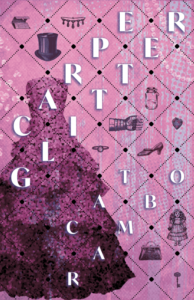 Carpe Glitter comes out in November from Meerkat Press. It’s a present-day fantasy novelette featuring Nazis, hoarding, and female stage magicians. This was fun to write and is in the same story-universe as my various Wizards of West Seattle stories.
Carpe Glitter comes out in November from Meerkat Press. It’s a present-day fantasy novelette featuring Nazis, hoarding, and female stage magicians. This was fun to write and is in the same story-universe as my various Wizards of West Seattle stories.
The Tor book: Still lacks a title, as you can see, but my current favorite is Spaceship, To Go, which I think is GENIUS but I am always the worst judge as to which of my many ideas actually are genius. Just turned around the first set of edits, which were fun and on the mark, and next comes the line-editing part, so I will be curious to see what that looks like, and am anticipating it. When I get those and go through them, I’ll do my own read-aloud and polish pass. I do think I have a scene to add — I’m just not sure what it is, so I’m waiting to hear what the editor thinks. The sequel’s half-written and on deck to finish the first draft in November.
Middle-grade book: I’m about to pick this up and finish fleshing it out before it goes out to beta-readers by the end of the first week in October. It’s currently 40k words and needs to grow by 15-20k more.
Exiles of Tabat: Currently a completed and incredibly messy and incoherent first draft (as always) sitting on the sidelines. Once the middle-grade book is off, this gets picked up and the plan is to have it also off to beta readers, this time by October 31.
Novella project: Got something here I’m currently outlining, and I’m not going to say anything more about that until it’s written, but it’s got me really excited and lets me pay homage to one of my favorite books.
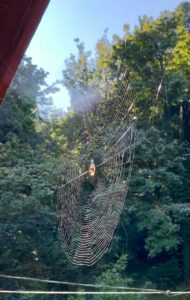 Got one story finished up and gently cooking on the back burner with the intent of serving it up to Beneath Ceaseless Skies, in part because it should be their kind of story, in part because they’ve published Tabat stories before, and last part because Scott’s such a good editor. Another story is in similar state. It’s a short little near-future SF piece and I think it’s going to be one of the good ones if I’m willing to take some time with it. I’m taking it on a writing retreat with me next week. I’ve got a third near-future, novelette or novella length SF story that’s been itching at me and which feels like I can hit out of the park if I take my time with it and do the topic justice; it’s about a third written, I think.
Got one story finished up and gently cooking on the back burner with the intent of serving it up to Beneath Ceaseless Skies, in part because it should be their kind of story, in part because they’ve published Tabat stories before, and last part because Scott’s such a good editor. Another story is in similar state. It’s a short little near-future SF piece and I think it’s going to be one of the good ones if I’m willing to take some time with it. I’m taking it on a writing retreat with me next week. I’ve got a third near-future, novelette or novella length SF story that’s been itching at me and which feels like I can hit out of the park if I take my time with it and do the topic justice; it’s about a third written, I think.
In the Department of Stories-That-Are-Still-Mostly-In-My-Head: Got one bespoke story half-written, a possible anthology story, and another novella project in the offing that would involve working with someone whose writing I greatly respect, so I hope that last works out. As always, there’s a mass of story ideas in my notebook — the problem is never not enough ideas.
I will be co-hosting a monthly podcast starting in late 2019 and have been recording some episodes for that. Details to come — but that won’t be all, audio/video-wise. Plenty more on that to come.
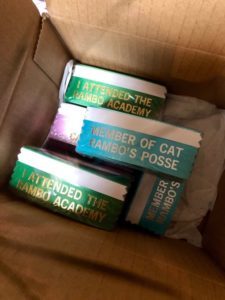 Patreon supporters have been showered with a varied range of content, including editing sessions like this one, snippets from work in progress, photos of the giant house spiders, special access to Twitch classes, market news, a poem, and a Taco Cat caption contest. Opening up the Discord server and adding more channels has been popular, and thank you to all of you who’ve signed up this month or upped pledges to make this the most successful Patreon month I’ve seen so far!
Patreon supporters have been showered with a varied range of content, including editing sessions like this one, snippets from work in progress, photos of the giant house spiders, special access to Twitch classes, market news, a poem, and a Taco Cat caption contest. Opening up the Discord server and adding more channels has been popular, and thank you to all of you who’ve signed up this month or upped pledges to make this the most successful Patreon month I’ve seen so far!
Travelwise: I’m off to a writing retreat next week and looking forward to it, then Surrey International Writers Conference in Surrey, BC (Mom’s going with me, so that should be fun. She’s been working on a romance, and this is my birthday present to her.) and MultiverseCon in Atlanta. That’s the last of my working travel for the year, and my intent is to not travel at all
I will save most of the Rambo Academy stuff for another time, but will say a couple things!
Diane Morrison has put together a terrific class on making/finding time for writing called Writing in the Cracks. The live version will be hosted online October 13 and there are still some free scholarships available.
Writing flash fiction is a good way to build your publication list as well as provide impetus for daily writing. Want a class on it that lets you go at your own pace, repeating things when you want to, in your space? There’s now the on-demand version of Writing Flash Fiction.
Critclub has been a smashing success and running semi-daily writing sprints in the motivation channel there has been great for my own productivity. If you’re a F&SF writer that has been looking for a good and thoughtful critique group, I hope you’ll check out the Rambo Academy Critclub.
#sfwapro
September 23, 2019
Guest Post: Michael Mammay on Reading Outside the Genre
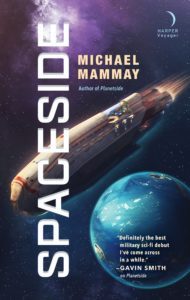 Stephen King said, “If you want to be a writer, you must do two things above all others: read a lot and write a lot.” I don’t know many pro writers who disagree with him. We might debate how much reading is enough, and I think a lot of us struggle to find time for writing, reading, and the myriad other things we have to do to live. To me, that competition for time makes the time that I do have to read more important.
Stephen King said, “If you want to be a writer, you must do two things above all others: read a lot and write a lot.” I don’t know many pro writers who disagree with him. We might debate how much reading is enough, and I think a lot of us struggle to find time for writing, reading, and the myriad other things we have to do to live. To me, that competition for time makes the time that I do have to read more important.
I’m a science fiction writer. Right now, I write military sci-fi thrillers. My debut novel, PLANETSIDE, came out in 2018 and the sequel, SPACESIDE, released in late August. I think it surprises people when I tell them that the biggest influence on PLANETSIDE was GONE GIRL, by Gillian Flynn. If you happened to have read both, you’re probably thinking to yourself…but wait…PLANETSIDE is nothing like GONE GIRL.
Of course it isn’t. Yet, here we are.
It was late 2014 and I’d just given up on a fairly bland fantasy novel I’d written in third person from three different points of view. It wasn’t exactly *bad* but it definitely wasn’t good enough. I’d had a kernel of an idea for this science fiction book in my head since I got back from Afghanistan—just a few notes that I’d jotted to myself while deployed—but I had no real plan to do anything with it. I was a bit burned out and had taken a few weeks off from writing. As I often do, I used that time to read. A critique partner of mine had just read GONE GIRL and recommended it. I read one chapter and I was hooked…the voice just exploded off the page.
That was it. That story idea in my head…it needed to be told in first person, and it needed a lot of voice. I sat down that night and wrote a short first chapter (that has subsequently been deleted) and sent it off to my most trusted readers. They loved it. They wanted more. Fast forward nine weeks and I had a first draft.
The influence didn’t stop there.
I didn’t start out to write what I did. In my mind, PLANETSIDE was going to be military science fiction. It’s set in a military science fiction world, and that’s how we market it (mostly), but I was as surprised as anyone when it turned into more of a mystery. I’ve come to love my twists. My hope when you sit down to read one of my novels is that I throw something at you that you don’t see coming. And who does that better than Gillian Flynn? Maybe Nelson Demille in THE GENERAL’S DAUGHTER, which was another influence.
Even the voice of my main character owes some of its origin to mystery, taking a big cue from noir. I love Kristen Lepionka’s mysteries…I think we employ similar voice. I don’t think a reader has to be a noir fan to enjoy it, but I think taking elements that are fairly standard in one genre and translating them into another can feel fresh. We know a lot of the tropes of the genres we read most…and we love them…that’s why we read the genre. I think sometimes flipping the script on those tropes can be interesting too.
I’m not saying to avoid reading in your own genre. Not by a long shot. I probably read three books in sci-fi or fantasy for each one I read outside. But there are writers doing great things in every genre. By branching out, you might find something for your writer kit bag that you can use in a new way. It just might be the thing that makes your book stand out.
 About the author: Michael Mammay is a science fiction writer. He is a retired army officer and a graduate of the United States Military Academy. He has a master’s degree in military history, and he currently teaches American literature. He is a veteran of Desert Storm, Somalia, and the wars in Iraq and Afghanistan. His debut novel, Planetside came out in July, 2018, and was selected as a Library Journal best book of 2018. The audio book, narrated by RC Bray, was nominated for an Audie award. The sequel, Spaceside, hit the shelves on August 27th, 2019. Michael lives with his wife in Georgia. You can find him on twitter (at)Michaelmammay or you can visit his website (note: website is michaelmammay dot com…don’t want to include a link in the email for risk of it going to spam)
About the author: Michael Mammay is a science fiction writer. He is a retired army officer and a graduate of the United States Military Academy. He has a master’s degree in military history, and he currently teaches American literature. He is a veteran of Desert Storm, Somalia, and the wars in Iraq and Afghanistan. His debut novel, Planetside came out in July, 2018, and was selected as a Library Journal best book of 2018. The audio book, narrated by RC Bray, was nominated for an Audie award. The sequel, Spaceside, hit the shelves on August 27th, 2019. Michael lives with his wife in Georgia. You can find him on twitter (at)Michaelmammay or you can visit his website (note: website is michaelmammay dot com…don’t want to include a link in the email for risk of it going to spam)
September 20, 2019
Where I’ll Be: MultiverseCon 2019
 I’m the Industry Guest of Honor at the first ever Multiverse Science Fiction and Fantasy Convention, along with my friends Seanan McGuire and John Picacio! It should be an amazing time; please come say hi if you’re in the area.
I’m the Industry Guest of Honor at the first ever Multiverse Science Fiction and Fantasy Convention, along with my friends Seanan McGuire and John Picacio! It should be an amazing time; please come say hi if you’re in the area.
Friday, October 18
1:00 PM Opening Ceremonies (Gather BC)
-Come kick of the convention with style, get to know some of the folks running it, meet our Guests of Honor, and hear about some of the cool and awesome things to do this weekend.
2:30 PM Ageism in Fantasy (Harding)
Cat Rambo (Mod), Chris A Jackson, Catherine Lundoff, Christopher Morgan
-Are only the young allowed to be heroes? The panel will discuss ageism in fantasy and how inclusion also means having older heroes.
4:00 How I Learned to Stop Worrying and Love Podcasting (Rabun)
Shannon Strucci (Mod), John Hartness, William Hayashi, Cat Rambo
-Want to podcast but don’t know where to start? Come hang out with professional podcasters and learn what type of equipment and software you will need to carry out your podcasting mission.
5:30 PM An Hour with Cat Rambo (Chattahoochee A)
Jesse Adams (Mod/Interviewer), Cat Rambo
Who knows what could happen here? There may be pickles. Or cheese. Maybe not. There will certainly be questions.
Saturday October 19
10:00 AM Signing (Signings) Read It Again: Dealers’ Room
11:30 AM Story Quickies: Made Up Slide Presentations (Savannah A)
Gigi Eng (Mod/EmCee), Craig Campbell, Cat Rambo
-Audience and Guest Participants are challenged to give presentations on random topics chosen by attendees. Pictures shown for 15 seconds must be incorporated into a 5 minute presentation. Prizes awarded for the most entertaining, most unexpectedly educational, and other superlatives!
1 PM Social Media for Writers (Sinclair Amphitheater)
Cat Rambo (Mod), Catherine Lundoff, Terry Maggert, Melissa McArthur, Bobby Nash
-Facebook, Twitter, Instagram, Pinterest, Tumblr, Goodreads, blog tours, cover reveals, contests, interviews… There’s only so much time in the day! As an author, what social media should you embrace? How do you decide? What’s the most effective? Join our authors to learn about different ways to use social media to your advantage as an author. Don’t be a slave to your social media. Own it!
4 PM Be Like Killjoys: Mapmaking in SpecFic (Rabun)
Cat Rambo (Mod), Bobby Nash, Chris A Jackson
– The TV show, Killjoys, gives the viewer a map of their world in the opening credits. Maps can help a reader know more about an imaginary world, and it can help a writer outline world-building details such as trade routes, rival civilizations, and class divisions. Come make a map with us! Each participant will have paper and colored pencils and will follow along as the panelists draw a basic map. Participants will add their own unique features to the map to reflect the world they want to build.
(Extended note from Track Director: Each participant will have paper and colored pencils and will follow along as the moderator draws a basic map. Participants will add their own unique features to the map to reflect the world they want to build.)
8:30 PM Rathskellar Readings (Sinclair Amphitheater)
Ceres K. Wright (Mod), Dana Cameron, Meg Elison, Bobby Nash, Errick Nunnally, Cat Rambo, Alyse Steves
– Got a story? Like to hear it, here it go! Grab a drink and come down to the Sinclair Amphitheater (WRITE) room! Be prepared to read for 5-7 minutes from one of your works. Choose wisely!
Sunday, October 20
10 AM LGTBQ+ in Fandom ((Chattahoochee A)
Darie L.K. Wolfson (Mod), K.D. Edwards, Marcus Haynes, Catherine Lundoff, Havana Nguyen, Cat Rambo
-A discussion about the unique perspectives, challenges, and considerations of the LGTBQ+ community as it engages with geeky fandoms.
11:30 AM The Many-Faced God: Unraveling Sub-Genres in Fantasy (Harding)
Cat Rambo (Mod), Scott Hawkins, Melissa McArthur, Seanan McGuire, Christopher Morgan
– For much of the early history of SFFH the operative terms for the genre were fantasy and sword and sorcery. But, today we have YA, Epic Fantasy, Urban Fantasy, High Fantasy, Dystopian, Dark Fantasy, Heroic Fantasy and upwards of 50 more subgenres. Are they really that distinct or are they simply marketing tools? The panel will discuss the state of the genre and talk about the development of the subgenre.
2:30 PM Part of the Pack: Horror Under the Speculative Fiction Umbrella (Ogeechee)
Cat Rambo (Mod), Marcus Haynes, Tiara Janté, R.J. Joseph, Kenesha Williams
– All in the family! This panel discusses how horror’s inclusion under the Speculative Fiction umbrella impacts the genre. Do you find that the inclusion negates many of the sub-genre distinctions, effectively flattening it out? Is this good or bad? How are authors able to stand out so that readers can find their work?
September 11, 2019
Guest Post: Alanna McFall Reveals How Fanfiction Helped Me Write My Novel
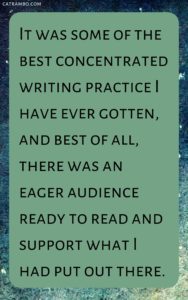 Note from Cat: I copy-edited Alanna’s recent novel, The Traveling Triple-C Incorporeal Circus and was pleased to do so because I think it’s one of the outstanding fantasy books of 2019. It is gentle fantasy, an on-the-road feminist version of Peter Beagle’s A Fine and Private Place. I highly recommend this book, particularly to people who love literary fantasy. If you enjoy her essay, please check the book out!
Note from Cat: I copy-edited Alanna’s recent novel, The Traveling Triple-C Incorporeal Circus and was pleased to do so because I think it’s one of the outstanding fantasy books of 2019. It is gentle fantasy, an on-the-road feminist version of Peter Beagle’s A Fine and Private Place. I highly recommend this book, particularly to people who love literary fantasy. If you enjoy her essay, please check the book out!
I still remember the moment I learned what fanfiction was.
I was in seventh grade and deep deep deep in an obsession with the Harry Potter novels. I was speaking to a ninth grade girl in the same school play as me and she mentioned that she loved Harry Potter as well, and all the extra stories she had found.
Extra stories? Had JK Rowling written something about Harry Potter that I hadn’t gotten my hands on yet? Where could I find these stories? This girl corrected me: no, these were written by other people, but they were about all sorts of things not in the books. People were writing these stories and all I had to do was look for them and I would have no end of Harry Potter, long before the next book came out. This revelation rocked my world. Who else knew about this concept? What was out there for me?
Through middle and high school I set about reading as much fanfic as I could get my hands on. I wrote a great deal of my own, testing out ideas just for the thrill of making a mark on stories I loved, but didn’t have the courage to share it online until I was in college. That became yet another revelation, a world that I could now access as an active participant. It was some of the best concentrated writing practice I have ever gotten, and best of all, there was an eager audience ready to read and support what I had put out there. I know for a fact that a lot of that practice paid off in my professional life.
Sometime around 2013, I got invested in a few audio dramas, particularly the fitness app Zombies! Run, which used audio clips to tell a zombie apocalypse story in the second person, with “you” as one of the survivors who had to run to escape danger. I fell in love with many of the characters and set about writing as much fanfic as I could, but found myself with a unique challenge. The only way I and the rest of the audience had ever interacted with these characters was through their voices. No visuals, no narrative prose to set the scene, no facial expressions to analyze, we only had a few sound effects and the dialogue. So if I wanted the readers of my fic to know when the snarky Canadian radio host was speaking, as opposed to his sappy British partner, I had to make sure their dialogue “sounded” as close to the dialogue of the show as possible.
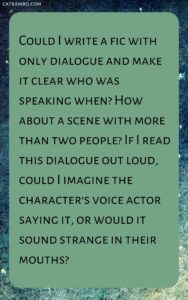 Once I started focusing in on dialogue, this became a personal challenge for me, beyond what fanfiction already was. Could I write a fic with only dialogue and make it clear who was speaking when? How about a scene with more than two people? If I read this dialogue out loud, could I imagine the character’s voice actor saying it, or would it sound strange in their mouths? What sorts of words and verbal tics did these characters use that I could employ to indicate when they were speaking? The harder I worked at getting these voices down, the more positive responses I got from my new friends in the fandom and the harder I tried. (And in a fortuitous story of the modern age, I became friends with another fanfic writer for Zombies! Run who, six years later, is now my fiancee.)
Once I started focusing in on dialogue, this became a personal challenge for me, beyond what fanfiction already was. Could I write a fic with only dialogue and make it clear who was speaking when? How about a scene with more than two people? If I read this dialogue out loud, could I imagine the character’s voice actor saying it, or would it sound strange in their mouths? What sorts of words and verbal tics did these characters use that I could employ to indicate when they were speaking? The harder I worked at getting these voices down, the more positive responses I got from my new friends in the fandom and the harder I tried. (And in a fortuitous story of the modern age, I became friends with another fanfic writer for Zombies! Run who, six years later, is now my fiancee.)
When it came to writing my debut novel, The Traveling Triple-C Incorporeal Circus, I took those lessons and utilized them as well as I could. A large portion of my novel concerns the three main characters (two ghosts and a mime) embarking on a road trip and talking with one another along the way. Giving Chelsea, Carmen and Cyndricka distinct voices became a vital part of my writing process, and thankfully my work has been worthwhile, with reviews pointing out the distinct voices as a strong point of my book. Spending so much time working with voices that other writers had laid out for me helped me to find unique voices of my own, and I could not be happier about that.
Which is not to say that everything that works in fanfic works in a novel.
One of my biggest struggles was getting back into the habit of writing exposition. In fanfic, you can always assume that the reader knows the world, setting and background of the story you’re working within. More than once when writing Triple-C, I had to remind myself that all of the rules of the ghostly world were not already common knowledge, that I had to set the stage and articulate whatever the reader needed to know in order to enjoy the story. Sure, if I was writing an alternate universe story in fanfic, I would need to sketch out the world more, but in my writing in the “canon-verse”, I had gotten lazy about exposition. At least a few of my early editors were confused why the ghosts could not get into a car for the road trip and save everyone some time. (The answer to that, incidentally, is that the physical car would move through the ghosts’ incorporeal bodies, leaving them behind.)
Without the thriving fanfiction community that I was part of, I think my novel would look (and sound) very different from how it does today. And I know for certain that my life would look different without the people I met through my fandom days. I have not been very active in writing fanfiction for a while, but every now and then I dip my toes back in to stretch out some old writing muscles and remind myself what I love about it. Writing fanfiction is not a lower or lesser way of writing than original work; they can feed into each other and overlap, each with its own strengths and weaknesses.
And beyond all of that, no matter if you ever make a cent off of it or not, writing fanfic is fun. Because really, what’s better than writing an angsty canon divergence fic or a fluffy Tattoo Artist/Florist AU? Nothing.
 About the author: Alanna McFall is a novelist, short-story writer, and playwright. Originally from Minnesota, she lived in a number of places on either coast before landing in the Bay Area, where she is a resident playwright with PlayGround San Francisco. Alanna is the 2019 winner of the June Anne Baker Prize for female playwrights representing a gifted new comedic or political voice. When not writing, she is a theater administrator, avid cross-stitcher, and podcast nerd. Follow her work and upcoming projects at alannamcfall.com or find her on Twitter as @alannamcfall. The Traveling Triple-C Incorporeal Circus is her first novel.
About the author: Alanna McFall is a novelist, short-story writer, and playwright. Originally from Minnesota, she lived in a number of places on either coast before landing in the Bay Area, where she is a resident playwright with PlayGround San Francisco. Alanna is the 2019 winner of the June Anne Baker Prize for female playwrights representing a gifted new comedic or political voice. When not writing, she is a theater administrator, avid cross-stitcher, and podcast nerd. Follow her work and upcoming projects at alannamcfall.com or find her on Twitter as @alannamcfall. The Traveling Triple-C Incorporeal Circus is her first novel.
September 8, 2019
Why You Can’t Teach Writing
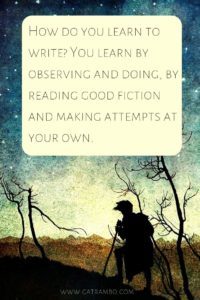 How do you learn to write? You learn by observing and doing, by reading good fiction and making attempts at your own. The truth is that writing is primarily self-taught, that the axiom that you must write a million words is on the mark, and that the first truth is this: To learn to write, you must be writing.
How do you learn to write? You learn by observing and doing, by reading good fiction and making attempts at your own. The truth is that writing is primarily self-taught, that the axiom that you must write a million words is on the mark, and that the first truth is this: To learn to write, you must be writing.
With my students who are writing and thinking about writing, I would have to actively give them bad advice like Play videogames rather than write. Don’t read anything. Only write when you’re in the mood. for them not to get better. That’s the plain and simple truth.
Do Writing Classes Help?
Writing classes do help – or can, at any rate, depending on what you do with them. They can supply short-cuts, impetus, tricks and techniques. They can kick you in the butt and make you produce, by forcing you to give fellow students a piece to critique, or via homework or in-class timed writings. They can provide inspiration to keep going by giving you something new to try or a way to break a log-jam or dry spell. They can build connections and new friends for you, sometimes friendships that will last for years or even decades.
But with or without them, if you’re writing and think about writing, you will get better at word-smithing, and that is true no matter what stage of the game you’re at. I schedule classes with other people for the Rambo Academy because they’re classes I want to take, which means I’ve been very lucky in recent years, getting to hear people like Seanan McGuire talk about writing series or Ann Leckie discuss writing space opera. Those classes always inspire me, and the novel coming out next year from Tor had its genesis in Leckie’s class. If I wasn’t willing to take classes, I wouldn’t have that inspiration.
What Should You Learn to Become a Writer?
What should you learn? Learn grammar, so you don’t have to rely on Word’s red wiggly line to tell you when you’ve got a subject/verb agreement. But remember a good, innovative writer colors outside the lines sometimes — know the rules so you can break them with panache. A writer writing to get a high score on Grammarly is missing the chance to innovate and improvise.
Learn how to show instead of tell, weaving a dream to pull in your readers. Pay attention to your senses so you can replicate those sensations in your text. Work on supplying the details without ever drawing attention to yourself, so you never commit the cardinal sin and remind the reader that they are reading.
Learn how to revise what you write, so you can relax about what you’re writing, knowing that you’ll make it perfect in the rewrite, and relax into that joyful flow of words. That’s another thing you must be doing in order to learn the skill, but also a place where working with a group that lets you critique other people’s work as well as be critiqued will help you learn it faster. Critiquing groups are a vast help but not in the way you think. You learn more from critiquing someone else’s work than you do from having you own critiqued, because the former forces you to articulate your ideas and understandings of fiction.
What Should You Read to Become a Writer?
What should you read? Read everything — contemporary and classic — and when you love or hate a piece of writing, go back and figure out why. Look at what other authors are doing and imitate them. Steal like Picasso and make things your own.
Read stuff that wins awards so you know what the current trends are and who’s producing what. You can’t predict where the market will be going, but you can know what territory has been so well-visited that it probably won’t be returned to.
Read nonfiction because so much of the stuff of story resides there. Nonfiction will give you details that help makes your dream real for the reader, as well as insight and information that will help shape your stories.
What Should You Do to Become a Writer?
You must write. Every day if you can manage it, even if it’s a quick 100 words squeezed in on your phone on the bus to work. You must figure out how to carve space and time for your writing, and you must defend that time from well-meaning friends and vile enemies alike. You must learn to step the hell away from social media sometimes and just write. Use the things you love to coax yourself along — ten minutes on Twitter if you finish that page, an ice cream cone for hitting your weekly word count.
You must — at some point — start sending stuff out. Don’t do the editor’s job for them by rejecting the work before they even see it. Send it out and write more while you’re waiting for it to come back.
Remember that writing is a professional activity, that if you’re putting yourself out into the public maybe you want to think about how you’re coming off in face to face and online interactions. It’s a small eco-system and you’ll find that the editorial intern you take out a frustration on today may well be the acquiring editor turning down your book somewhere down the line. Don’t assume you always have the right answer, and don’t be afraid to admit when you don’t.
The unexamined life is not worth living, Plato tells us, and I will add that it’s not one that makes you a better writer. If you want to understand the human heart, look to your own and all its petty mean behaviors as well as the nobility of which it is capable. Write what you know; write truth. All of this will help you become a writer.
But write. You cannot be a writer until you begin to write.




